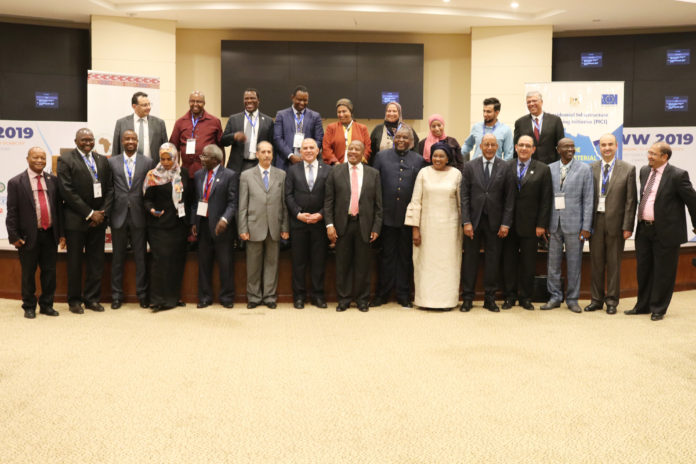|
Getting your Trinity Audio player ready...
|
By Nina Mitch
Member states and stakeholders of the Presidential Infrastructure Championing Initiative (PICI) recently gathered in Cairo-Egypt during the Cairo Water Week on 21 October to discuss the progress of infrastructural projects in Africa.
In his opening remarks, Jackson Mphikwa Mthembu, Minister in the presidency of South Africa, apologized on behalf of South Africa and President Ramaphosa for the recent incidents of violence in some parts of South Africa which led to the attacks on foreign nationals and destruction of their properties.
Mthembu emphasized on the importance of the African Continental Free Trade Area and the broader vision of “Agenda 2063” which he considered as a once-in-a-generation opportunity to achieve the necessary objectives. These aspirations, Mthembu says, tie in neatly with the objectives for a continental market with the free movement of persons, capital, goods, and services, which are crucial for deepening economic integration, and promoting agricultural development, food security, industrialization, and structural economic transformation.
“Meeting the challenge of a population boom and rapid economic growth will require an infrastructure revolution-and the PICI plays directly into that space. While the African Continental Free Trade Area is a landmark achievement, the promise of the agreement will only truly be realized through engagements like the one we are having today with regard to PICI. We all know the benefits of facilitating free movement of goods, services, and people when we open our borders and integrate. Africa’s GDP would increase as high as 6% every year,” Mthembu remarked.
With these steps, the prospects for future growth are truly remarkable and while the global economy slows, Africa is emerging as the next great growth frontier, participants at the meeting concurred.
It is estimated that the poor state of infrastructure in Sub-Sahara Africa with regard to electricity, water, roads, and ICT, reduces national economic growth by 2% and productivity by as much as 40%. African Development Bank (AfDB) estimates that Africa needs to spend between $130 billion and $170 billion a year to meet infrastructure needs. According to the CEO of African Union Development Agency-NEPAD (AUDA), Dr. Mayaki, the lack of funding for infrastructure projects in Africa is not linked to the financial resources but to the bankable project.

“At the AUDA we created an instrument which is called 5% agenda,” Mayaki said, 5% agenda is a campaign which is aimed at increasing the allocations of African asset owners to African infrastructure from its low base.
“We are trying to demonstrate to investors that investing in African projects is advantageous through bankable projects,” Mayaki emphasized.”
He also advocated for increased prioritization of trans-continental projects such as the trans-Sahara highway and multi-modal trans-connector interconnector projects and opined that they can significantly accelerate intra-Africa trade.
To achieve these lofty ideals, the problem of political instability in most African States must be addressed, says Egyptian Minister of Water Resources and Irrigation Dr. Mohamed Abdel Atty.
“Those who want to invest resist because of the insecurity situation in some parts of the continent. This is the story of Egypt, during the instability in 2011, we lost roughly 35billion USD transferred abroad and it affected our economy and we are still suffering to recover from this shock. We have to work hard to bring back stability to our continent” Dr. Mohamed Abdel emphasized.
The PICI initiative is seamlessly embedded within the Programme for Infrastructure Development in Africa (PIDA) framework which was also conceived to accelerate regional infrastructure development through the political championing of projects. The role of the champions brings visibility, unblocks bottlenecks, and give critical momentum in the resource mobilization efforts.
Nevertheless, the outcome of the recently commissioned review of the PIDA-Priority Action Plan (PAP) is expected to inform the development of a new phase of PIDA that will include priority projects for the next decade 2021-2030.
According to Madam Gnounka Diouf, Minister for Economic Advisory Services out of the 400 projects Senegal has in PIDA, a very few have reached maturity precisely because of the problems of studies and financing issues.
“Much more work needs to be done on the study and financing phase, with greater involvement of the private sector in the context of public-private partnerships,” she said.
If there are any lessons to be learned from the implementation of PIDA-PAP by the Member States, it is that with clear methodology on how the project will be prioritized for implementation more successes would be recorded, says Mayaki stressed.














